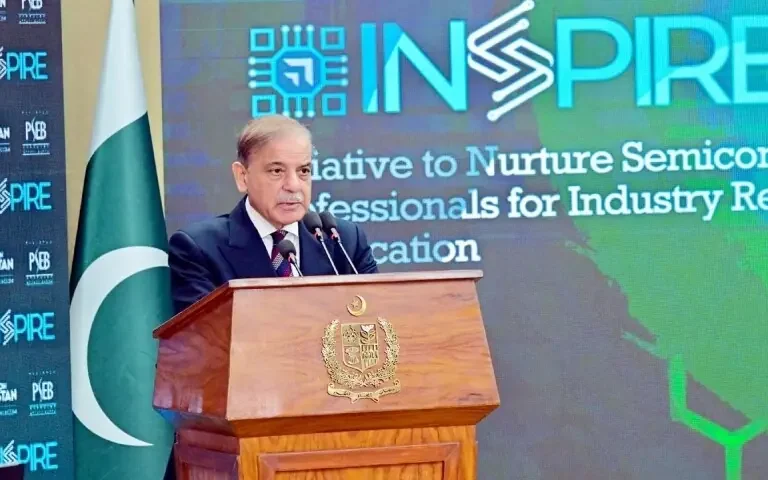ISLAMABAD: On Tuesday, Prime Minister Shehbaz Sharif announced a plan to train more than 7,000 specialists in semiconductor research and design.
According to the prime minister, the INSPIRE program marks Pakistan’s entry into the $600 billion global semiconductor ecosystem and is “a milestone in Pakistan’s transition to a knowledge-based digital economy.”
7,200 people would receive training in semiconductor research and design as part of the initiative.
Shehbaz Sharif marked Pakistan’s revolutionary stride toward technological self-reliance and global competitiveness by launching the “initiative to nurture semiconductor professionals for industry, research & education” (INSPIRE).
PM announces “INSPIRE,” a program to train 7,200 professionals with the goal of gaining a piece of the $600 billion worldwide market.
The prime minister stated in his speech that INSPIRE’s launch marked a turning point in the nation’s shift to a knowledge-based digital economy, where human capital, research, and innovation propel long-term growth. “We want to equip Pakistan’s youth for the industries of the future.” We are laying the groundwork for a new economic frontier with this project, one in which Pakistan will contribute skill, technology, and creativity to the global economy,” he said.
The prime minister oversaw the rapid execution of activities to meet goals while assuring stakeholders that the government fully supported this program.
“This is a drop in the ocean,” he remarked, referring to the Rs 4.5 billion the planning ministry has set aside for the Public Sector Development Programme (PSDP). “There is no funding problem for this program.”
An economy without cash
According to the prime minister, the establishment of the Pakistan Digital Authority was a first step in the government’s digitization goal.
The entire Federal Board of Revenue (FBR) is going digital. Shehbaz Sharif stated, “The government is also working to usher in a cashless economy.”
He commended the PSEB and the IT ministry for their initiatives to create a workforce with the necessary skills to meet the needs of the global economy. The prime minister also praised the Special Investment Facilitation Council (SIFC) for facilitating investments that support national technological programs and fostering robust public-private partnership.
Shaza Fatima Khawaja, Minister of Information Technology and Telecommunications, reiterated in her speech the government’s dedication to creating a digitally empowered Pakistan.
The audience was informed on the strategic roadmap by Dr. Naveed Sherwani, head of the National Semiconductor Task Force, who also highlighted Pakistan’s potential to establish a world-class semiconductor ecosystem.
The implementation of the semiconductor program, which will train thousands of professionals and connect academia, research, and industry to create a sustainable national semiconductor ecosystem, is a source of pride, according to Abu Bakar of PSEB.
Research and training
Over a five-year period, INSPIRE hopes to teach 7,200 experts in semiconductor design, verification, and research. Nine public institutions in Pakistan’s north, center, and south will be involved, and six integrated circuit (IC) labs will be established.
INSPIRE will establish the groundwork for fabrication and Outsourced Assembly & Testing (OSAT) capabilities as the initial stage of the nation’s larger National Semiconductor Development Roadmap, allowing Pakistan to participate in the global semiconductor supply chain.
Pakistan has embarked on a new phase of digital transformation, characterized by creativity, opportunity, and resilience, with the launch of INSPIRE.
The program reflects a national goal to develop international collaborations, develop youth potential, and establish Pakistan as a legitimate player in the trillion-dollar global semiconductor market.
Reorganizing Smeda
A meeting on the Small and Medium Enterprises Development Authority’s reorganization plan was earlier chaired by PM Shehbaz. He gave the relevant authorities instructions to promote small and medium-sized business registration in order to facilitate their access to business loans and promote industrial growth.
He claimed that the emergence of cottage SMEs was connected to the nation’s industrial expansion. He conveyed his appreciation with the Ministry of Industries and Production’s efforts to restructure Smeda.
SOURCE: DAWN NEWS





